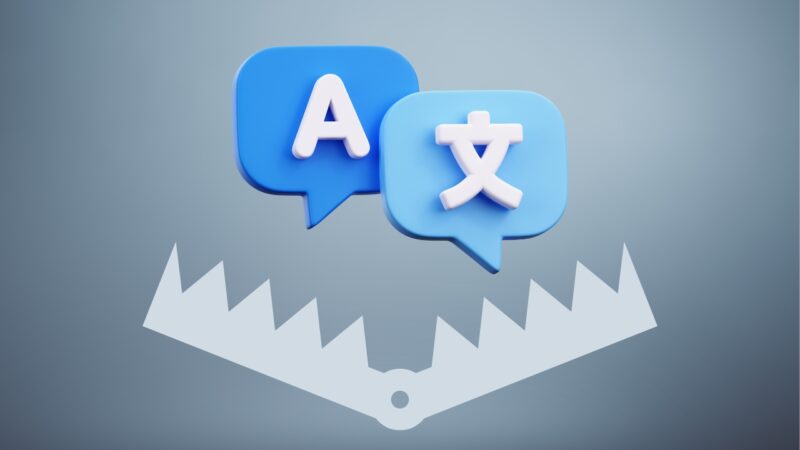Learning all there is to know about a language is a process that can last for decades. Mastering a standardized version of the language might seem enough, but wait until you come across things like different dialects and other elements that will make your head hurt.
While learning can be a good pastime for some, being serious about this is what is needed to ensure success. Plus, being aware of common cultural faux pas is quite helpful.
Let me share my two cents on these common issues with you.
1. The Challenge of Consistency and Regular Practice

One of the most common hurdles learners face is the lack of consistency and regular practice. That is why people who live or study abroad, and use the language frequently, learn fast. This consistent exposure reinforces what has been learned, making it easier to retain and recall.
It is exactly how I managed to learn French, while I was studying at Université Montpellier.
Sadly, many learners fall into the trap of sporadic study sessions, which can lead to slow progress and frustration. With frequent communication, you will have a much better understanding of the cultural factors behind the sentences and phrases.
To tackle this issue, setting a regular study schedule and sticking to it can transform the learning experience. It’s not just about the time spent but the quality of practice that leads to learning even the smallest details that make a world of difference.
2. The Pitfall of Unrealistic Goals
Setting goals is essential in the language learning process, but unrealistic expectations can be a significant setback. For instance, make a schedule you can utilize to make the process smoother. Many dream of rapid mastery, expecting to become fluent in an unreasonably short time.
This ambition, while admirable, often leads to disappointment and frustration. Setting specific, achievable goals helps maintain motivation and provides a clear path forward. Many struggle with setting realistic goals for a simple reason they do not understand what requires their attention.
Discussing this issue with a native can be of great help.
Interesting Fact: Duolingo has more than half a billion registered users, with 37 million of them being active once a month.
3. The Importance of Diverse Learning Methods

Relying solely on one method of language learning is a common mistake that will impact the progress negatively. Learning the language is a complex process that involves multiple skills, including:
- Listening
- Speaking
- Reading
- Writing
Each complements the others, and not focusing on any one of them can lead to an incomplete understanding of the language. Furthermore, students should utilize other methods like:
- Interactive software
- Language exchange with native speakers
- Reading authentic materials.
- Listening to music or podcasts
This diversity prevents boredom but it also ensures a better understanding of the language’s core.
4. Overcoming the Fear of Speaking
The fear of speaking can significantly impede progress, as speaking is the best way to practice and internalize what has been learned. For those who do not know, this is a condition better known as Xenoglossophobia.
Engaging in conversation, even with errors, is a critical step in the learning process. It allows learners to identify and correct mistakes, improve pronunciation, and gain much-needed confidence. Every speaker of a language once made mistakes.
It’s a natural and necessary part of learning.
5. The Role of Cultural Understanding
A lack of cultural understanding can lead to misunderstandings and affect effective communication. Learning about the social norms, customs, and traditions of a language’s native speakers provides invaluable context that enhances language learning.
This cultural immersion can come from watching films, reading literature, and interacting with native speakers, offering insights into the nuances of the language. Cultural references and idioms, for example, can significantly improve fluency and the ability to communicate authentically.
Neglecting these can lead to misunderstanding, which is not a pleasant thing, especially when you’re about to talk with a foreigner.
“Being bilingual positively affects cognitive abilities, including attention and task-switching capacities.” – Cerebrum Report, 2012
Cultural exchange programs, such as student exchanges or international workshops, offer immersive experiences that foster not only language proficiency but also deep cultural understanding. These programs facilitate direct interaction with individuals from diverse backgrounds, enriching one’s comprehension of social norms and customs while enhancing communication skills in a natural and meaningful way.
6. Avoiding the Trap of Overreliance on Translation

Translating directly from one’s native language to the target language is a common practice among beginners. This approach can lead to significant errors and hinder the development of true language proficiency. Languages have unique structures, idioms, and expressions that don’t always have direct equivalents in other languages.
The best explanation for the challenge of translating idioms comes from a report from the University of Nizwa, Oman:
“Idioms are expressions whose meanings cannot be deduced from their individual parts.”
Learning to think in the target language, without the crutch of translation, encourages a deeper understanding and more natural language use. This shift from translation to direct thought and expression can be challenging but is crucial for achieving fluency.
However, with the advent of language learning apps, learners now have additional tools to aid in this transition, offering interactive exercises and immersive experiences to reinforce language acquisition.
I used to struggle with this aspect when I was learning French. At the same time, this wasn’t the problem with English since I’ve learned the language when I was in my teenage years.
The Bottom Line
As you can see, many cultural faux pas should be avoided when learning a foreign language.
Here, I’ve outlined the commonest ones, and why is it important for you to steer away from them.
I am certain you will find these tips useful.
I’m Ravi Prasad. I am a professional Italian and French translator. I’m currently learning Scottish and how it differentiates from British, and I believe people can benefit from my language learning experiences.
Related Posts:
- The Polyglot Approach to Learning Multiple Languages
- 5 Best Cultural Exchange Programs for Language Learners
- Learning Spanish Alphabet Pronunciation (With Sound)
- Top 10 Books for Learning German Language - Improve…
- Introduction to Beginners German - Your First Steps…
- How to Choose the Right Language Learning Method?

